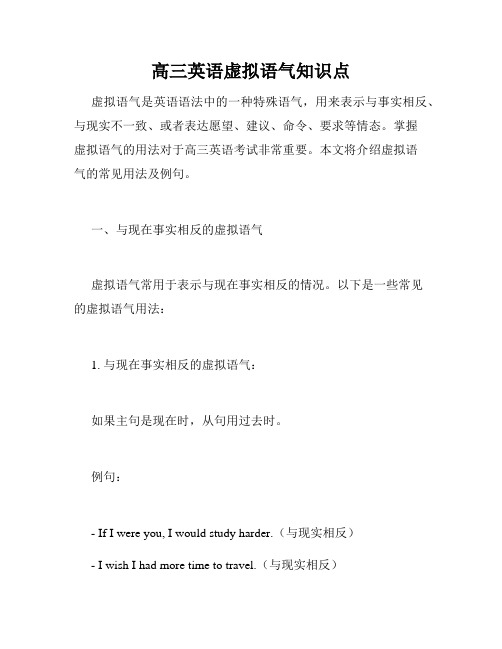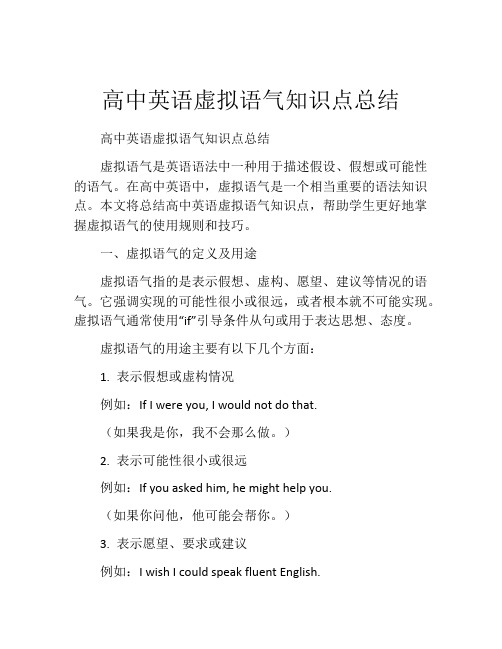高考英语语法讲解——虚拟语气
高中英语2025届高考语法复习虚拟语气知识讲解

高考英语语法复习虚拟语气知识讲解一、基础知识(一)什么是虚拟语气谓语动词的作用不仅可以表示动作的时间、状态、假设(情感),也是一种语气(mood)的表现形式,表明说话的目的和意图。
(语气包含陈述语气、祈使语气、虚拟语气、疑问语气)虚拟语气用于表示假设、愿望、建议、命令等非真实或虚拟的情况,即与真实相反。
上学的时候老师经常举的一个例子,"If I were you"因为我不可能是你,这是一种不可能存在的事实,所以这是个虚拟语句。
总而言之英语中的虚拟语气可以分为两大体系:一是表示与事实相反的,或者是假象的情形,通常由if引导,叫做虚拟条件句;另一个体系是在名词从句中使用虚拟语气,表示建议,命令或者要求等语气,类似于上述美剧常用的台词。
(二)虚拟语气的用法这一部分我们主要用虚拟语气在条件句中的用法作为讲解与现在事实相反:If I had a map, I would lend it to you.如果我有地图我就借给你。
(但我没有)与将来事实相反:If I were to do the job, I would do it in a different way. 要是我来做这工作,我会是另一种做法。
(言外之意不是我做这个工作,用虚拟表达是我做这份工作的可能性很低)与过去事实相反:If anything had happened, he would have let us know.如果发生了什么情况,他早就通知我们了。
(所以没事发生)它们的共性都是表示与事实相反或者实现可能性不大3.特殊情况①在极少情况下,从句的谓语动词用原形,主句的谓语动词可用陈述语气(比较官方,正式,大气的说法,口语很少使用)If that be the official view, it cannot be accepted.如果这是官方的看法,这是不能接受的。
②if可以省略,但是语序要改为倒装Were I Tom I would refuse.如果我是汤姆我会拒绝。
高中英语高考高考英语语法总复习课件:虚拟语气 (共82张PPT)

【例11】 When a pencil is parted in a glass of water, it looks as if it _____(break)_. 【例12】 Eliza remembers everything exactly as if it ______ (happen)yesterday.
主句 would/should/could/might
If he didn’t come tomorrow, we would put off the meeting.
主过将从过, 主过将完从过完 would do/did would have done/had done
【例1】 If we ______ (take)the other road, we might have arrived here in time for the meeting.
【例13】 Look at the terrible situation I am in! If only I ______ (follow)your advice. 知识扩展:follow/take sb's advice
【例13】 Look at the terrible situation I am in! If only I had followed (follow)your advice. 知识扩展:follow/take sb's advice
做题时注意:动词的形式根据它所表示的时间作出相应的调整
一分为二,先找时间再判断时态。
【例4】
If we ______ (book)a table earlier, we couldn’t be standing here in a queue.
高中英语虚拟语气的用法归纳

高中英语虚拟语气的用法归纳以下是高中英语虚拟语气的用法归纳:虚拟语气是一种特殊的动词形式,表示假设、愿望、建议、命令、猜测等非真实的情况。
一、基本用法1. 与现在事实相反条件从句:If + 主语 + 动词过去式(be 动词用 were)主句:主语 + would/should/could/might + 动词原形例句:If I were you, I would study harder. (如果我是你,我会更努力学习。
)Wouldn't life be boring if we had everything we wanted? (如果我们想要什么就有什么,生活岂不是很无聊?)2. 与过去事实相反条件从句:If + 主语 + had + 过去分词主句:主语 + would/should/could/might + have + 过去分词例句:If I had known your phone number, I would have called you. (如果我知道你的电话号码,我就给你打电话了。
)Couldn't you have done better if you had tried harder? (如果你再努力些,难道不能做得更好吗?)3. 与将来事实相反条件从句:① If + 主语 + 动词过去式② If + 主语 + were to + 动词原形③ If + 主语 + should + 动词原形主句:主语 + would/should/could/might + 动词原形例句:If it rained tomorrow, we would stay at home. (如果明天下雨,我们就待在家里。
)If she were to come here tomorrow, I would be very happy. (如果她明天来这儿,我会非常高兴。
)If he should fail in the exam, how disappointed his parents would be!(要是他考试不及格,他父母该多失望啊!)二、固定搭配1. wish 后的宾语从句与现在事实相反:从句用一般过去时与过去事实相反:从句用过去完成时与将来事实相反:从句用 would/could + 动词原形例句:I wish I were as tall as you. (我希望我和你一样高。
高考英语二轮专题语法系列--虚拟语气讲义

虚拟语气虚拟语气表示说话人的主观愿望、猜测、建议或与事实不符的假设等,也可以表示可能性较小的情况或不可能发生的情况,而不是客观存在的事实(表示客观事实要用陈述语气)。
虚拟语气是由句中谓语动词的特殊形式表现出来的。
虚拟语气常用于复合句中,也可用于简单句。
比较:If she asks me tomorrow,I shall do it.如果她明天请求我,我会做的。
(陈述语气,说话人认为请求的可能性大)If she asked me tomorrow, I should do it. 假如她明天请求我,我会做的。
(虚拟语气,说话人认为请求的可能性小或不可能请求)1 虚拟语气的用法1-1 虚拟语气用于条件状语从句中1)表示与现在事实相反的情况If I were/was not busy today, I should go with you.如果我今天有空,我会同你一起去的。
If he were/was here,he might talk with you.如果他在这里,他可能会同你谈谈。
If I were you,I wouldn't accept her suggestion.如果我是你,我不会接受她的建议。
If I knew the answer to the question,I should/ would tell you.如果我知道问题的答案,我当然会告诉你。
If we left now, we should/would arrive there in time.如果我们现在就动身,我们会准时到达那里。
If he didn't do exercise every day,he wouldn't be so strong.如果他不每天锻炼,他不会那样强壮的。
If it weren't raining, we would go fishing.要是现在不下雨,我们就去钓鱼了。
高中必备知识点解析虚拟语气的形式与用法

高中必备知识点解析虚拟语气的形式与用法虚拟语气是高中英语必备的语法知识点之一。
它在英语中经常被用于表达假设、愿望、建议、命令和推测等情态,通过使用虚拟语气,可以使语言更加丰富和准确。
本文将深入解析虚拟语气的形式与用法。
一、虚拟语气的形式1. 虚拟语气的一般现在时:用于表示与现在事实相反的情况。
其结构为:主语+动词原形(倒装)。
例如:If I were you, I would study harder.(如果我是你,我会更加努力学习。
)2. 虚拟语气的一般过去时:用于表示与过去事实相反的情况。
其结构为:主语+动词过去式(倒装)。
例如:If I had seen her yesterday, I would have said hello.(如果我昨天见到她,我会问好的。
)3. 虚拟语气的过去完成时:用于表示对过去情况的猜测或不可能发生的情况。
其结构为:主语+动词过去完成式(倒装)。
例如:I wish I had studied harder for the exam.(我希望我为考试努力学习。
)二、虚拟语气的用法1. 表达假设与条件:If I were you, I would travel around the world.(如果我是你,我会环游世界。
)I wish I had a million dollars.(我希望我有一百万美元。
)2. 表达愿望与建议:I wish you would stop smoking.(我希望你戒烟。
)It's important that she arrive on time.(她按时到达很重要。
)3. 表达命令与要求:The teacher ordered that the students be quiet.(老师要求学生们保持安静。
)She insisted that he leave immediately.(她坚持要他立刻离开。
)4. 表达推测与猜测:He looks as if he were sick.(他看起来像是生病了。
高三英语虚拟语气知识点

高三英语虚拟语气知识点虚拟语气是英语语法中的一种特殊语气,用来表示与事实相反、与现实不一致、或者表达愿望、建议、命令、要求等情态。
掌握虚拟语气的用法对于高三英语考试非常重要。
本文将介绍虚拟语气的常见用法及例句。
一、与现在事实相反的虚拟语气虚拟语气常用于表示与现在事实相反的情况。
以下是一些常见的虚拟语气用法:1. 与现在事实相反的虚拟语气:如果主句是现在时,从句用过去时。
例句:- If I were you, I would study harder.(与现实相反)- I wish I had more time to travel.(与现实相反)2. 表达建议、要求或命令等的虚拟语气:主句用“should”或“ought to”引导,从句用动词原形。
例句:- It is necessary that she should arrive on time.(建议)- He demanded that they leave immediately.(命令)二、与过去事实相反的虚拟语气虚拟语气还可以用来表示与过去事实相反的情况。
以下是一些常见的虚拟语气用法:1. 与过去事实相反的虚拟语气:如果主句是过去时,从句用过去完成时。
例句:- If he had studied harder, he would have passed the exam.(与过去事实相反)- I wish I hadn't eaten so much.(与过去事实相反)2. 表达愿望、建议或命令等的虚拟语气:主句用“should”或“ought to”引导,从句用动词原形或过去时。
例句:- It is high time that he applied for a job.(建议)- I wish he would stop talking.(愿望)三、与将来事实相反的虚拟语气虚拟语气还可以用来表示与将来事实相反的情况。
以下是一些常见的虚拟语气用法:1. 与将来事实相反的虚拟语气:如果主句是将来时,从句用过去完成时。
高三英语语法讲解----虚拟语气

(1)表示说话人所说的话不是事实,而是一种假设、猜测、怀疑 等,假设是不可能或者不大可能发生或实现的;
(2)表示说话人的愿望、要求、命令、建议等
02 related concept
虚拟语气的基本用法:
if条件句中的虚拟语气:
虚拟语气的基本用法:
在if引导的虚拟条件状语从句中,谓语动词含有had、were、should时, 可以把if省略,将had、were、should、could提到句首,变成倒装句。 If I were in your position,I would do the same. →Were I in your position,I would do the same. 假如我处在你的位置,我也会这样干的。 If you had come earlier,you would have caught the bus. →Had you cght the bus. 如果你来得早些,你就会赶上公共汽车了。 If it should rain tomorrow,we would not go climbing. →Should it rain tomorrow,we would not go climbing. 如果明天下雨的话,我们就不去爬山了。
If从句
与现在相反
did(be用were)
与过去相反 与将来相反
had +done
did(be用were) were to+ do should +do
主句
would /should /could / might
+do
would /should /could / might +have + done
高中英语虚拟语气知识点总结

高中英语虚拟语气知识点总结高中英语虚拟语气知识点总结虚拟语气是英语语法中一种用于描述假设、假想或可能性的语气。
在高中英语中,虚拟语气是一个相当重要的语法知识点。
本文将总结高中英语虚拟语气知识点,帮助学生更好地掌握虚拟语气的使用规则和技巧。
一、虚拟语气的定义及用途虚拟语气指的是表示假想、虚构、愿望、建议等情况的语气。
它强调实现的可能性很小或很远,或者根本就不可能实现。
虚拟语气通常使用“if”引导条件从句或用于表达思想、态度。
虚拟语气的用途主要有以下几个方面:1. 表示假想或虚构情况例如:If I were you, I would not do that.(如果我是你,我不会那么做。
)2. 表示可能性很小或很远例如:If you asked him, he might help you.(如果你问他,他可能会帮你。
)3. 表示愿望、要求或建议例如:I wish I could speak fluent English.(我希望我能说流利的英语。
)二、虚拟语气的形式虚拟语气形式主要有以下几种:1. 虚拟语气的过去式:在虚拟语气中,一般用过去式来表示对现在或未来的虚拟。
例如:If I had more time, I would read more books.(如果我有更多时间,我就会多看书。
)2. 虚拟语气的过去完成式:过去完成式用于表示“如果过去已经发生了某些事情,结果会是怎样”。
例如:If I had studied harder in high school, I would have gone to a better college.(如果我在高中时学习更努力,我就能进入更好的大学。
)3. 虚拟语气的“would + 动词原形”形式:“would +动词原形”形式通常用于表示愿望、要求、建议或者可能性。
例如:I wish you would stop smoking.(我希望你戒烟。
)If you would like to come, you are welcome.(如果你愿意来,欢迎你。
- 1、下载文档前请自行甄别文档内容的完整性,平台不提供额外的编辑、内容补充、找答案等附加服务。
- 2、"仅部分预览"的文档,不可在线预览部分如存在完整性等问题,可反馈申请退款(可完整预览的文档不适用该条件!)。
- 3、如文档侵犯您的权益,请联系客服反馈,我们会尽快为您处理(人工客服工作时间:9:00-18:30)。
虚拟语气
一、非真实条件句中的虚拟语气
1.和现在的事实相反
从句:一般过去时(were/did);主句:过去将来时(would do)
E.g.:I am not free today. If I ______free today, I _____ (go)and visit some of my friends.
2.和过去的事实相反
从句:过去完成时(had done);主句:过去完成时(would have done)
E.g.:If my lawyer ___________(come)here last Saturday, he __________(keep) me from going.
3.和将来的事实相反
从句:①were to + 动词原形②should +动词原形③动词过去式;
主句should/would/could/might +动词原形
E.g.:If I were to see Tom, what _______ you ________ (ask)me to tell him?
二、宾语从句中的虚拟语气
1.wish后面宾语从句中的虚拟语气,表示与事实相反的愿望。
其表达形式一般是将从句的谓语动词退后一个时态。
例如:
1)与现在事实相反: wish + (that)+ did(were)
E.g.:I wish I were as healthy as you.
E.g.:I wish that I had a plane.
2)与过去事实相反: wish + (that)+ had done
E.g.:I wish I had been to the concert last night.
E.g.:I wish you had written to him.
3)与将来事实相反: wish + would/could/might + do
E.g.:I wish he would forgive me.
2. 在某些动词后的宾语从句中需用should+动词原形的虚拟语气形式。
“should”能够省略。
一个坚持insist; 两个命令order, command ; 三条建议suggest , advise, propose;
四项要求demand, request, require, ask; 另外有:prefer、recommend
注意: suggest表“暗示说明”时insist表“坚持认为”时不用虚拟语气
E.g.:He ordered that the students (should) wash the clothes every week by themselves.
E.g.:The doctor suggested that she (should) have an operation at once.
*His face suggested that he had been punished by the teacher.
三、主语从句中的虚拟语气
1.It be+过去分词+that…+(should)+动词原形+…
过去分词:suggested, requested, ordered, proposed
E.g.: It is required that nobody (should) smoke here.
E.g.: It’s suggested that everybody (should) buy a dictionary
2. It be+形容词+that…+(should)+动词原形+…
形容词:important, necessary, natural, right, wrong, better,proper, funny, strange, surprising…
E.g.: It is necessary that we (should ) have a walk now.
E.g.: It's important that we (should) take good care of the patient.
3. It be+名词(a pity/a shame/ no wonder)that…+ (shou ld)+动词原形+…(表示惊异、懊悔、失望等情感)
It is a regret that he (should) miss this golden chance.
四、表语从句、同位语从句中的虚拟语气
在suggestion, proposal, idea, plan, order, advice ,decision等名词后面的表语从句、同位语从句中要用虚拟语气,即(should)+动词原形。
E.g.: My suggestion is that we (should) leave at once.
E.g.: I make a proposal that we (should) hold a meeting next week.
五、状语从句中的虚拟语气
1、用在由as if, as though引导的状语从句中,表示和现在事实相反或对现在的怀疑,用过去时;表示过去想象中的动作或情况,用过去完成时;表示将来用would + 动词原形。
E.g.: It seems as if the man were his brother.
E.g.: This device operated as though it had been repaired.
2.用在lest, for fear that和in case引导的状语从句中,这时谓语动词用(should)+动词原形
E.g.: She closed the windows lest she catch cold.
六、其他句式
1、It’s (high/low) time 从句:
It is (high) time that从句谓语动词要用过去式或用should加动词原形,但should不可省略。
E.g.: It is time that the children went to bed.
E.g.: It is high time that the children should go to bed.
2、一些介词短语
But for your help, we couldn’t have succeeded.
Nothing could live without the sun.
3、比较if only与only if
only if 表示“只有”;
I wake up only if the alarm clock rings.
if only 则表示“假如……就好了”。
其从句中的谓语动词用过去时或过去完成时。
If only I knew more.
If only the alarm clock had rung.
七、虚拟语气难点
1、错综虚拟与隐含虚拟
错综虚拟:If you hadn’t bought the ticket last week, how would you go now?
隐含虚拟:情境中提供虚拟语气
Suppose there were no gravity, objects would not fall to the ground when dropped.
She wasn’t feeling very well. Otherwise she wouldn’t have left the meeting so early.
He telephoned to inform me of your birthday, or I would have known nothing about it .(连词)I might have given you more help, but I was too busy .(连词)
Given more time, we could have done it better .(分词短语)
… … Such mistakes could have been avoided .(通过上下文)
2、倒装
①. Were it (=If it were) not for their help, we couldn’t have got over the difficulties.
②. Had I (=If I had) known about it, I would have told you.
③. Should anyone (=If anyone should) call, please take a message.。
